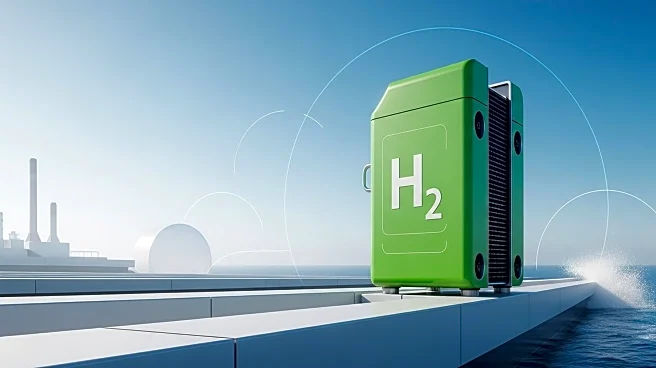What's Happening?
The National Waterway Transport Agency (ANTAQ) in Brazil has announced significant progress in decarbonizing maritime transport at five key ports. These ports, including Itaqui, Pecém Private Use Terminal, Paranaguá, Santos, and Açu, have been selected for their strong Environmental Performance Index and ongoing energy transition projects. The initiative is part of a Brazilian-German cooperation, facilitated by the German development agency GIZ, aimed at reducing greenhouse gas emissions. The ports are implementing infrastructure for green hydrogen and offering incentives such as tariff discounts and priority berthing for ships with lower carbon footprints. The study, which has completed three phases, highlights the ports' readiness for the green transition, with some already developing decarbonization plans and installing solar panels.
Why It's Important?
The decarbonization efforts at these Brazilian ports are crucial for maintaining Brazil's competitiveness in global trade and meeting international climate goals. By transitioning to cleaner energy sources and reducing emissions, these ports can align with global emissions reduction targets, potentially attracting more environmentally conscious shipping companies. The initiatives also contribute to improving air quality for coastal communities, showcasing a commitment to sustainable development. The focus on green hydrogen and low-carbon fuels could position Brazil as a leader in sustainable maritime transport, influencing other countries to adopt similar practices.
What's Next?
The ports are expected to continue developing and implementing their decarbonization plans, with the Port of Açu already completing its plan. The study recommends creating a National Green Hydrogen Plan and offering tax incentives to accelerate the adoption of clean fuels. Partnerships to establish green corridors are encouraged, which would further reduce emissions from global shipping. The Ministry of Ports and ANTAQ will play a crucial role in articulating public policies and encouraging investment in sustainable infrastructure, ensuring the long-term success of these initiatives.
Beyond the Headlines
The decarbonization drive at Brazilian ports could have broader implications for international shipping standards and environmental policies. As Brazil advances its green initiatives, it may influence global maritime regulations, encouraging other nations to adopt similar measures. This shift could lead to increased collaboration between countries on sustainable shipping practices, fostering innovation in clean energy technologies and infrastructure.









